This is the third of our blog posts from the Making an Impact workshops we ran in August. Ben Lee (Programme Director, Shared Intelligence) talked about his research into rhyme times and maternal mental health.
Last year, Shared Intelligence and Essex County Council conducted research into the impact on maternal mental health of rhyme times which had been modified and also made more consistent. The research was sponsored by Arts Council England.
Maternal mental illness is estimated to affect one in five mothers aged 36 or less. Rhyme times in Essex libraries reach 4,000 to 5,000 mothers a year, many of whom attend regularly. This means that each year rhyme times reach around 1,000 mothers experiencing maternal mental health issues.
The research aimed to answer 3 research questions:
- Do rhyme times have a positive effect on maternal mental health and if so, how and why?
- What is the reach of these activities and can it be increased?
- Can a more structured approach to rhyme times be implemented consistently in a public library context?
What they did
Using evidence to make modifications to rhyme times
Shared Intelligence started by conducting a literature review which looked at research which mentioned group or individual reading and/or singing with children which could be applied to rhyme times. For example they found that synchronous maternal behaviour (synchronised movement, or vocalisation) is associated with increased dopamine which supports human bonding. In other words when mothers sing or mirror actions with their child (such as face to face), it boosts their mood and helps them bond.
Based on this research library Essex library staff (from 8 libraries) and Shared Intelligence made a list of small modifications which could be applied across rhyme times. For example:
- say “well done for getting here” at the start because poor mental health can affect motivation to leave the house and join social situations
- include at least one synchronised face to face song or story and explain the reasons for doing this to parents (libraries now say “do please join in and face your child - it’s good for them and boosts our ‘happy hormones’...”)
- explain that parents and children can get up and move around at all times, and put them at ease about the possibility of their child crying - which helps people to feel relaxed
- explain that the rhyme time benefits both parents and children - children have fun and learn stories, whilst parents have a good time too
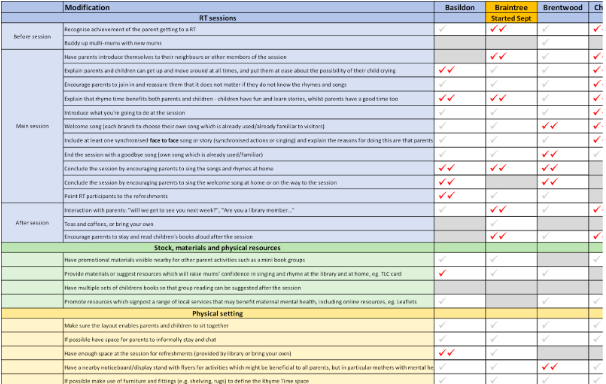
Each of the 8 libraries in the research project then picked the modifications which they thought would be useful for them to adopt. The objective here was to modify existing rhyme times, not create a special mental health rhyme time.
Measurement and observation
Shared Intelligence and Essex libraries collected evidence using ‘before and after’ mood charts, change stories and focus groups.
Mood charts were used before and after each session; with separate ones for mothers and other carers. This was deemed the least disruptive way of measuring moods, and people are used to providing a response using smiley faces. However the charts did have limitations, in that they were publicly viewed and individuals’ before and after scores could not be linked. In future the report suggested this could be done anonymously by using a tablet or counters in opaque pots. Also Shared Intelligence/Essex didn’t conduct a survey before implementing the modifications. This would be good to do in future before any changes are made to get a baseline.
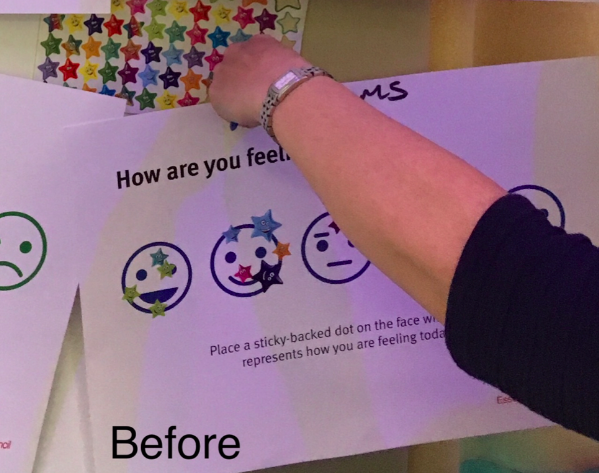
Change stories were from mothers who attended rhyme time regularly during 2017, and who agreed to be interviewed in response to a request from Essex Libraries for women who felt rhyme times had benefited them in some way. Real names were replaced with pseudonyms. The change stories are in the full report.
Focus groups were conducted immediately after rhyme time sessions at the libraries with adults who had just taken part. The focus groups were to discover whether, how and why the rhyme times were affecting mother’s mood or mental wellbeing. In them participants discussed how rhyme times were affecting their mood and wellbeing, and what specifically it was about the way rhyme times were delivered that contributed to making mothers feel different.
What were the findings?
Returning to the research questions:
Impact: Did rhyme times have a positive effect on maternal mental health?
Using the mood charts (taken before and after each session) there is a strong pattern of mothers, upon leaving the modified rhyme time sessions, saying they felt happier than when they arrived.
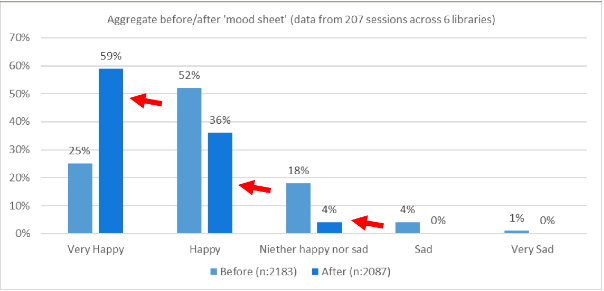
From the focus group discussions 2 specific elements of the sessions stood out as contributing to an improvement in mood in the course of the 30-minute session: the “warm welcome”; seeing their child enjoy themselves; and the act of singing. This was also corroborated in mothers’ Post-It note comments in response to the question What part of today’s rhyme time made the most difference to how you feel?
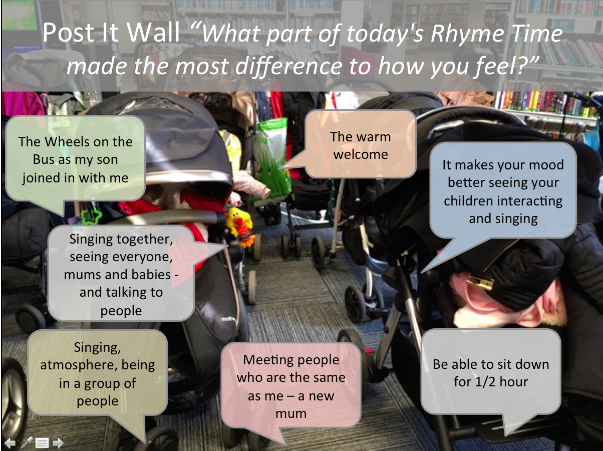
They included:
- The Wheels on the Bus as my son joined in with me
- singing together, seeing everyone, mums and babies - and talking to people
- singing, atmosphere, being in a group of people
- meeting people who are the same as me - a new mum
- the warm welcome
- it makes your mood better seeing your children interacting and singing
- be able to sit down for 1/2 hour
The focus groups also talked about the immediate effect of the rhyme times with benefits being:
- feelings of achievement at making it there in the first place
- enjoyment from social singing and stories
- chance to interact with other mothers
- structure to the day
- seeing your child enjoy themselves
- reassurance as a parent
- respite - a break from ‘one of those days’
Change stories showed impact happening over weeks / months with:
- reducing anxiety and lifting mood
- improving personal confidence - to go out, take part
- alleviating isolation, boredom and stress
- social interaction
- sense of achievement
Reach: what was the reach of these activities and can it be increased?
Data from sign-in sheets showed that almost three-quarters (72%) of adult carers at rhyme time in the 8 libraries which were part of the project were mothers. In other words, rhyme times have been reaching the audience the project is most interested in.
The researchers were also interested in the breakdown between first-time mums and those who already had a child or children, because the evidence is that first-time mothers are less likely to seek help for maternal mental health problems than ‘multi-mums’. First time mothers are also less likely to seek help for mental health support. Here the data shows that three in five (61%) attendees were first-time mothers.
In short, rhyme times are effective in reaching mums, and first time mums.
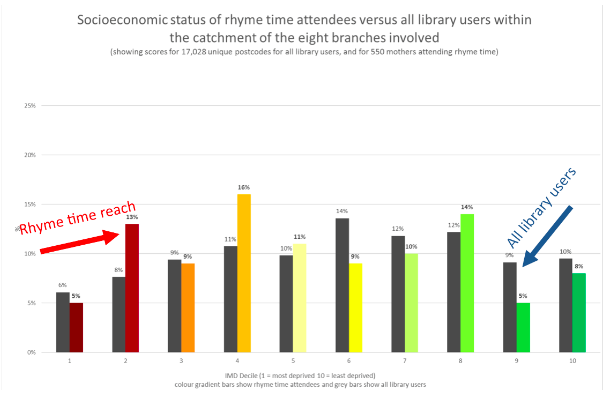
The table above shows the Index of Multiple Deprivation (IMD) decile spread of mothers attending rhyme times (rhyme times shown as coloured bars) compared with the IMD spread of all library users in the same catchment areas as the 8 libraries in this research (grey bars). It shows mothers from across all IMD deciles attended the sessions with no notable skewing towards upper or lower deciles. It also shows that among rhyme time mothers there was a slightly higher proportion from postcodes falling in to the second and fourth most deprived deciles, than among users of those same libraries overall.
Fidelity: can a more structured approach to rhyme times be implemented consistently in a public library context?
The researchers believe a more structured approach could be implemented because of how the library staff engaged with the project. Frontline staff:
- were consistent in applying the modifications which stemmed from their sense of ownership and involvement in creating the modifications - Essex have now now made some of the modifications mainstream practice through revised training for staff across their 74 libraries
- acquired increased knowledge of maternal mental health which further motivated them to maximise consistency and quality
- realised they could make a difference
Staff involvement and training
Parents First, a national charity based in Basildon (which many of the staff were aware of) were asked to run a staff training session which took place halfway through the project. It covered:
- the basics about maternal mental health and its prevalence
- how maternal mental health is a spectrum
- symptoms and conditions to watch out for
The session with Parents First helped develop empathy, understanding and insight as context for why this work. More broadly staff perceptions of what rhyme times were about changed. Comments included:
“We used to look at rhyme times from a child’s point of view, but it has showed us just how phenomenal it is for mums” and “We looked at mothers differently - who was that mum we didn’t recognise, or the one who sat quietly?”
Staff were also brought together regularly to discuss problems, and share learning about how to make the modifications more effective.
Essex is now scaling up the modified rhyme times through a new training pack, alongside awareness training about maternal mental health
What follow up actions could be taken?
The researchers recommend that other library services should:
- take this work and discuss with staff
- decide if this approach helps the library service contribute to local priorities
- decide what data to collect and what success would look like
- provide staff with basic awareness training in mental health (incl maternal mental health)
- consider a bigger piece of research which uses these results as a proof of concept and feasibility study for larger more sophisticated research, or a formal clinical study.
You can see the full report online. The project also set up a set of shareable tools for use by other library services looking to learn from or replicate the approach and a quick guide to the research intended for a general audience (including library staff and the public).
The slides from Ben's presentation are viewable online.
For more information about this project and to be kept in touch with further work on libraries and mental health please contact charlotte.boulton@sharedintelligence.net.
To read all the posts relating to this workshop, search: #LibrariesImpactMeasurement